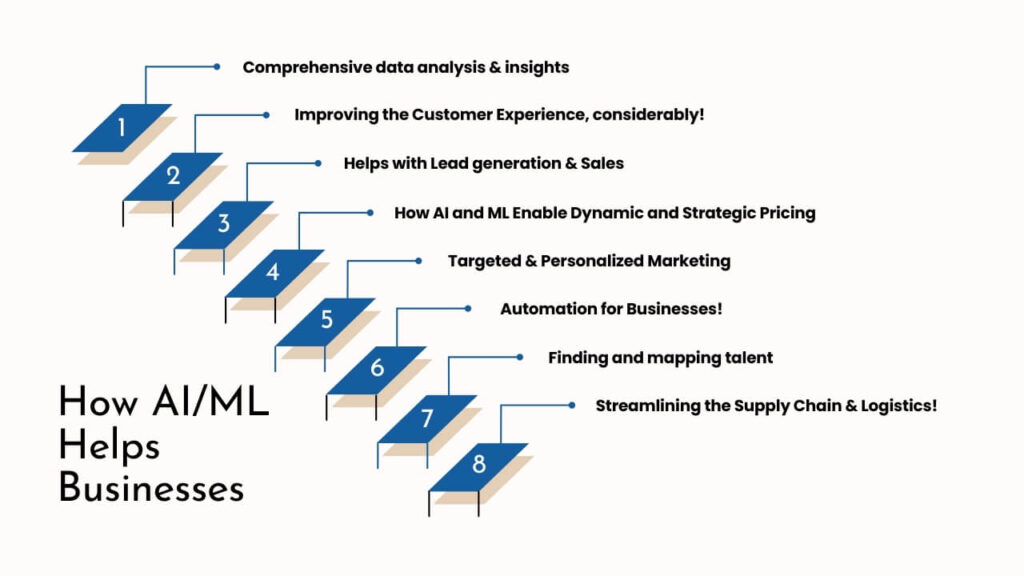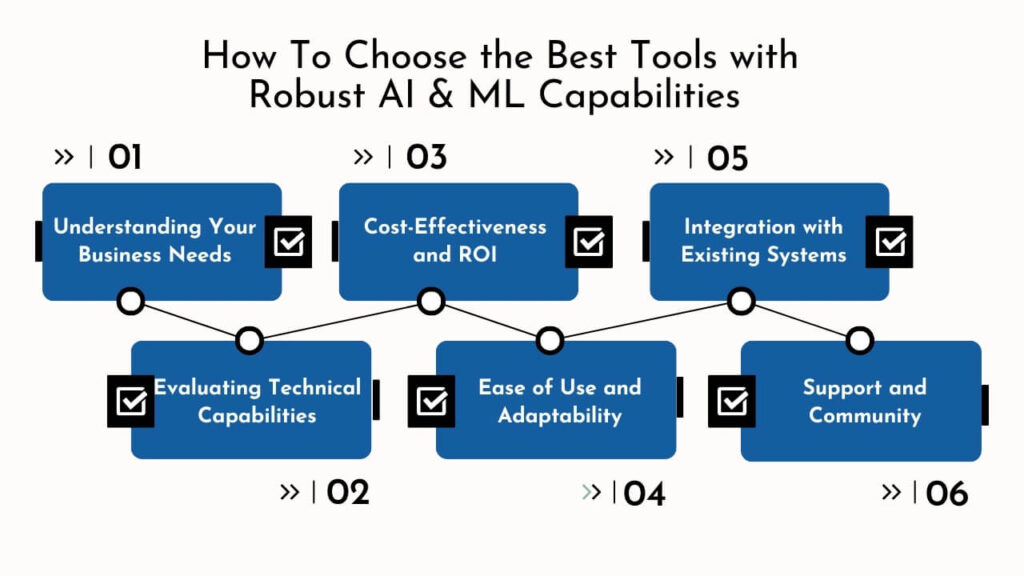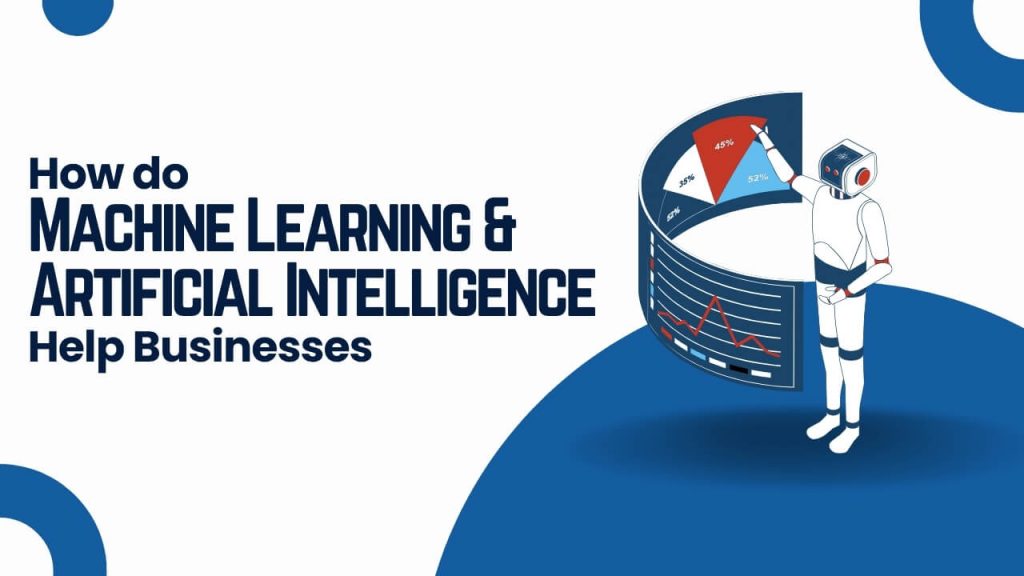Introduction
Artificial intelligence (AI) and machine learning (ML) have a favorable impact on enterprises around the world. Both fields are transforming many industries by assisting firms in achieving their aims. Many industries and enterprises are using AI and ML in a wide range of ways.
Thank you for reading this post, don't forget to subscribe!Did you know, that 35% of businesses have already adopted AI tools for their business operations and as per another research 46% of respondents have implemented ML for diverse use cases and it is core to the business?
Machine learning and artificial intelligence (AI) have transformed the way businesses run by automating repetitive operations that previously required human participation. This saves not only time and resources but also reduces human mistakes. Using these technologies allows organizations to focus on more strategic initiatives while streamlining their operations.
In this article, we will be covering how AI and ML tools are helping businesses streamline operations, ensure best-in-class customer satisfaction, and help you stay ahead of the competition. Let’s get started.
How AI/ML Helps Businesses?

AI/ML is transforming industries by enhancing efficiency, accuracy, and decision-making. Whether you’re aiming to improve customer experiences, streamline operations, or make smarter, data-driven decisions, AI and ML hold the key. Below, we’ll cover the range of benefits of AI and ML across various business phases. Let’s keep reading!
- Comprehensive data analysis & insights
Machine learning and artificial intelligence (AI) allow firms to analyze and get insights from their data. These tools can manage large datasets and complex calculations, allowing us to spot patterns, trends, and abnormalities that might otherwise go unreported.
Based on past data, machine learning models are able to predict future results. Predictive modeling is used in businesses such as retail and restaurants to manage inventory and forecast demand. In addition to lowering carrying costs and increasing stock levels, this helps companies make sure their items are available when customers need them.
Through data-driven insights, AI can support decision-makers. AI can extract valuable information from unstructured data sources like customer reviews, social media posts, and images. This enables businesses to make informed decisions, improve operational efficiency, and enhance customer experiences.
- Improving the Customer Experience, considerably!
In today’s competitive business environment, providing an outstanding customer experience is a major concern for companies. Artificial intelligence (AI) and machine learning (ML) are now essential tools for improving customer experiences. These technologies help businesses stay on top of everything, boosting conversion rates and making marketing campaigns more effective.
- AI and ML let companies collect data in real-time, including customer demographics, browsing history, purchase patterns, market trends, and competitor analysis to ensure the best-in-class & personalized customer experience – throughout.
- By offering personalized experiences, businesses can build stronger relationships with customers and increase loyalty.
- AI and ML can also analyze social media interactions and customer feedback to understand customer sentiment and identify potential issues or opportunities for improvement.
- ML algorithms track and analyze customer behavior across various touchpoints, providing insights into preferences and purchase drivers.
- Additionally, these tools help businesses segment their customer base and send relevant, targeted marketing messages by analyzing customer data and behavior, to ensure higher conversions, customer satisfaction, and ROI.
- Helps with Lead generation & Sales
Lead generation and sales are among the most crucial aspects of any business, directly impacting revenue, growth, and market competitiveness. Getting lead generation and sales strategies right ensures a steady stream of customers, maximizes profitability, and builds long-term customer relationships. And, to get it right – AI and ML tools can help you. Let’s understand how.
- Identifying High-Quality Leads: AI and ML analyze vast amounts of data to identify potential leads with a high probability of converting into customers. This helps sales teams focus their efforts on the most promising prospects.
- Tailored Recommendations: AI analyzes customer data to provide personalized product recommendations, increasing the chances of upselling and cross-selling.
- Predictive Analytics: ML models analyze historical sales data, market trends, and other relevant factors to forecast future sales. This helps businesses set realistic targets, manage inventory, and plan resources effectively.
- Automated Follow-Ups: AI can automate follow-up emails and reminders based on customer interactions and engagement levels, ensuring timely and consistent communication.
- Sales Cycle Optimization: ML algorithms analyze sales processes to identify bottlenecks and inefficiencies, recommending improvements to streamline the sales cycle.
- Dynamic Pricing & Marketing: AI tools analyze market conditions, competitor pricing, marketing strategies, and customer demand to suggest optimal pricing and the most effective advertising strategies, which helps businesses maximize revenue and competitiveness.
- How AI and ML Enable Dynamic and Strategic Pricing
Dynamic and strategic pricing are crucial strategies for businesses across various industries, including retail, e-commerce, hospitality, and transportation. These pricing approaches involve adjusting prices in response to market conditions, customer demand, competitor pricing, and other relevant factors to maximize revenue and profitability. AI and ML play a pivotal role in enabling businesses to implement and optimize dynamic and strategic pricing strategies effectively.
- Predictive Analytics: AI and ML algorithms analyze vast amounts of historical and real-time data, It helps to predict customer behavior, and demand patterns with high accuracy and adjust prices in a way that’s best for business and customers as a whole.
- Real-Time Adjustments: AI enables businesses to implement pricing changes in real time based on incoming data. For example, an e-commerce platform can adjust prices of products dynamically based on browsing behavior or competitor pricing changes.
- Optimization Algorithms: ML algorithms optimize pricing strategies by testing different pricing scenarios and identifying the most profitable pricing points. This includes conducting A/B testing to evaluate the impact of price changes on customer behavior and revenue.
- Personalization: AI can personalize pricing strategies by segmenting customers based on demographics, purchase history, or preferences. This allows businesses to offer personalized discounts, promotions, or loyalty rewards tailored to individual customer segments.
- Competitor Monitoring: AI-powered tools can monitor competitor pricing strategies in real time. Businesses can adjust their own pricing dynamically to remain competitive or differentiate their offerings based on value-added features.
- Targeted & Personalized Marketing
Marketing can be both expensive and challenging, but with targeted and personalized marketing to specific customer segments and individual preferences, businesses can improve engagement, increase conversion rates, and build stronger customer relationships. Personalized marketing ensures that the right message reaches the right audience at the right time.
How do AI and ML help with targeted and personalized marketing?
- AI and ML tools revolutionize targeted and personalized marketing by leveraging vast amounts of data to gain deep insights into customer behavior, preferences, and trends.
- These technologies analyze data from various sources such as purchase history, browsing patterns, social media interactions, and demographic information to create detailed customer profiles.
- Machine learning algorithms then segment customers into distinct groups based on their characteristics and behaviors, allowing businesses to tailor marketing messages and offers to each segment.
- Furthermore, AI-powered predictive analytics can forecast future customer actions and preferences, enabling proactive marketing strategies. This ensures that marketing efforts are not only personalized but also timely and relevant, ultimately driving higher engagement and conversion rates.
- AI and ML also enable real-time optimization of marketing campaigns by continuously analyzing performance data and adjusting strategies accordingly.
This dynamic and data-driven approach to marketing ensures that businesses get the most value out of their marketing investments, enhancing overall effectiveness and efficiency.
- Automation for Businesses!
Automation has had a substantial impact on virtually every business area. This is because it saves time and resources by streamlining tedious and repetitive processes. AI and machine learning can also help you automate your business. AI and ML are revolutionizing business operations by automating a wide range of tasks, leading to significant improvements in efficiency and cost savings.
According to a McKinsey report, AI can increase business productivity by up to 40%, and companies that have implemented AI-driven automation have seen up to 30% reductions in operational costs.
For instance, the retail giant, Amazon, uses AI and ML to analyze amounts of sales data and predict future demand, Amazon has optimized its stock levels, reducing excess inventory by 25% and cutting down stock-outs by 30%. This not only improves operational efficiency but also enhances customer satisfaction.
- Finding and mapping talent
Businesses employ this technique to identify the most talented individuals for their company. Traditionally, this procedure included examining resumes and holding interviews to select the best individuals.
But thanks to artificial intelligence (AI), companies can now find and map talent more quickly and efficiently. This helps to swiftly sift out unqualified prospects, saving time for both the company and the applicant.
Machine learning algorithms are another common application of artificial intelligence in talent sourcing. These algorithms can be used to detect trends in data relating to the talent that you are looking for.
This may include information such as resumes, job ads, and social media profiles. By identifying these patterns with ML, businesses can not only hire the best candidates but also save time, money, and other crucial business resources.
- Streamlining the Supply Chain & Logistics!
AI and ML tools work together to simplify and streamline the supply chain and logistics by optimizing processes, enhancing efficiency, and reducing costs. ML analyzes historical sales data and trends to accurately forecast future demand, ensuring that businesses maintain optimal inventory levels.
AI automates restocking based on real-time data, ensuring products are always available without overstocking, and optimizes warehouse layouts to make item retrieval quicker and more efficient.
AI also evaluates supplier performance and risks, helping businesses choose reliable partners and avoid disruptions. Predictive maintenance using ML monitors equipment for signs of wear and predicts failures, allowing for proactive maintenance and reducing downtime.
For example, Walmart leverages AI and ML to forecast demand accurately, ensuring shelves are stocked with the right products. Automated systems reorder stock as needed and optimize warehouse operations for efficiency. The integration of AI and ML has significantly improved Walmart’s supply chain efficiency, with the company reporting a 10-20% reduction in inventory costs and a 15-20% increase in inventory turnover.
This integration of AI and ML has made Walmart’s supply chain more efficient, cost-effective, and responsive to customer needs.
How To Choose the Best Tools with Robust AI & ML Capabilities?
With so many options out there, it can be overwhelming to know where to start. Don’t worry—we’ve got you covered! Below, we’ll walk you through the essential tips you need to know to select the perfect AI and ML tool that will deliver the best results for your business. Let’s keep reading!

Understanding Your Business Needs
Choosing the right AI and ML tool begins with a deep understanding of your business and industry needs. Start by identifying the specific problems you want to solve or the areas where you want to improve efficiency. Are you looking to enhance customer service, optimize your supply chain, or improve data analytics? Clearly defining your objectives will help you select a tool that aligns with your business goals.
And, choose the tool that is designed specifically for your industry to ensure the best results and seamless incorporation into your business process. Livelytics, for example, offers robust AI and ML capabilities that cater to various industries such as retail, restaurant, salon, and Hospitality.
Evaluating Technical Capabilities
Once you understand your business needs, evaluate the technical capabilities of potential AI and ML tools. Look for features such as data ingestion, data transformation, and the ability to handle complex analytics and visualizations. Based on your business challenges and industry needs, look for the right features while choosing the tool with AI & ML cabaolities. It’s important to choose a tool that can integrate seamlessly with your existing systems and scale with your business growth.
Cost-Effectiveness and ROI
Cost is a crucial factor when choosing an AI and ML tool. Assess the total cost of ownership, including initial setup, licensing fees, maintenance, and potential hidden costs. While choosing the right AI/ML tool for your business needs, you also need to consider the return on investment (ROI) the tool can deliver in terms of increased efficiency, reduced costs, and enhanced decision-making capabilities.
Pro-Tip: There are many cost-effective tools available with sub-subscription-based models, that allow you to scale up and scale down as per your business requirements while saving crucial business resources.
Livelytics, our AI/ML data tool is quite cost-effective with the subscription-based model(starting at just $299 per month). Also, you can avail a free demo to test its capabilities and then make a decision.
Ease of Use and Adaptability
The ease of use and adaptability of an AI and ML tool are essential for successful implementation and adoption within your organization. You don’t want to water your crucial business resources on extensive training for a tool. You want your staff to quickly understand the tool with no or minimal training. Additionally, it should be adaptable to various business processes and easily customizable to meet your specific needs.
Integration with Existing Systems
Seamless integration with your existing systems is critical for the smooth functioning of any AI and ML tool. Ensure that the tool you choose can easily integrate with your current software and hardware infrastructure. This will enable you to leverage your existing data and systems without significant disruptions.
For example, Livelytics is a leading data tool with AI/ML tools – specializing in industries such as restaurants, salons, retail, and hospitality can be integrated seamlessly with tools that are used in those industries. This ensures that you can easily incorporate Livelytics into your existing workflows, maximizing its benefits without extensive modifications to your current setup.
Support and Community
When you rely on a tool and if it goes out-of-service, it disrupts your business process. And, the last thing you want is – you can’t use your tool because you have no one to reach out to. So, while choosing the AI/ML tool for your business, make sure that your vendor offers comprehensive documentation and post-sales support.
It should include comprehensive support, including training, troubleshooting, and regular updates.
Livelytics is backed by a dedicated support team and a vibrant user community. This ensures that you have access to the help and resources you need to effectively utilize the tool and address any challenges that may arise.
To Sum Up!
As technology continues to advance, it’s crucial to stay up-to-date with the latest tools to remain competitive and ahead of the curve. AI and ML are constantly in the headlines for their transformative impact on businesses, from optimizing sales processes to enhancing customer experiences.
The key is understanding your specific business needs and selecting the right platform that delivers the results you’re seeking. And, while we are at it – Livelytics stands out as a leading platform with robust AI and ML capabilities designed to help you get the most out of your business operations in a simple and cost-effective manner. Don’t just take our word for it—book a free demo and see for yourself how Livelytics can revolutionize your business. Let’s get started!
